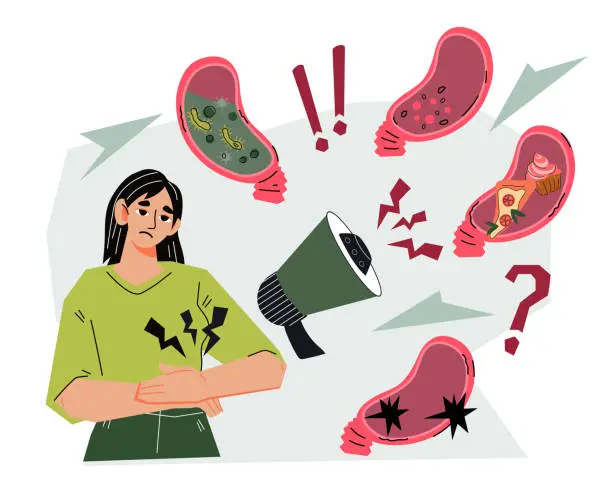Bloating is one of those frustrating sensations we all experience at some point—a tight, full feeling in the stomach that makes your clothes feel snug and your energy dip. While an occasional bloated day is normal, some people face chronic bloating that can disrupt daily life. If you find yourself asking, “Why am I always bloated?”, it may be time to explore the hidden triggers behind this uncomfortable condition.
1. Diet Choices That Might Surprise You
Many people immediately blame overeating when they feel bloated, but sometimes the culprits are far more subtle. Foods high in sodium, for example, can cause your body to retain water, leading to that puffy, bloated feeling. Processed foods and packaged snacks often contain hidden salts and preservatives that can exacerbate the problem.
Certain carbohydrates—particularly those in beans, lentils, broccoli, cabbage, onions, and carbonated beverages—are harder for some people to digest. These foods ferment in the gut, producing gas and leading to bloating. While these foods are nutritious, moderation and proper preparation can help minimize discomfort.
Additionally, artificial sweeteners like sorbitol and xylitol, found in sugar-free gum and diet products, can contribute to bloating by drawing water into the intestines and fermenting in the gut.
2. Eating Habits Matter
How you eat can be just as important as what you eat. Eating too quickly or talking while eating can cause you to swallow air, which accumulates in the digestive tract and leads to bloating. Skipping meals, on the other hand, can slow digestion, causing food to sit in your stomach longer and produce gas.
Chewing food thoroughly and eating smaller, more frequent meals can help ease the digestive process. Even small changes like avoiding straws and carbonated drinks while eating can make a noticeable difference.
3. Food Intolerances and Sensitivities
For many people, bloating is a sign of a food intolerance. Lactose intolerance, for example, prevents the body from breaking down lactose in dairy, resulting in gas, cramping, and bloating. Similarly, gluten sensitivity or celiac disease can lead to chronic bloating when gluten-containing foods are consumed.
Keeping a food diary can help identify patterns between what you eat and how bloated you feel. Once triggers are identified, avoiding or moderating these foods can provide significant relief.
4. Gut Health and Digestive Disorders
Sometimes bloating is not just about what you eat but how your gut functions. Conditions like irritable bowel syndrome (IBS), small intestinal bacterial overgrowth (SIBO), and gastroparesis can cause chronic bloating.
IBS affects the way your gut muscles contract, leading to bloating, cramping, and irregular bowel movements. SIBO occurs when bacteria overgrow in the small intestine, fermenting food prematurely and producing excess gas. If bloating is accompanied by severe pain, diarrhea, or constipation, it’s important to consult a healthcare provider for proper diagnosis and treatment.
5. Autoimmune Diseases
Some autoimmune diseases can contribute to persistent bloating. Conditions like celiac disease, Crohn’s disease, and ulcerative colitis cause inflammation and damage to the digestive tract, interfering with nutrient absorption and slowing digestion. This can lead to chronic gas, bloating, and discomfort. If bloating is accompanied by fatigue, unexplained weight changes, or other gastrointestinal symptoms, it’s crucial to discuss these issues with a doctor for proper evaluation.
6. Lifestyle Factors
Stress and lack of movement can also play a major role in bloating. Stress can alter gut motility, causing food to move more slowly through the digestive tract, while sedentary behavior can make it harder for gas to escape.
Incorporating regular exercise, deep breathing exercises, or yoga can improve digestion and reduce bloating. Staying hydrated also helps maintain proper digestion and prevents constipation, which is a common contributor to bloating.
7. Hormonal Fluctuations
For women, hormonal changes can be a hidden cause of bloating. Many experience bloating before and during menstruation due to shifts in estrogen and progesterone, which affect fluid retention and digestion. Pregnancy, perimenopause, and menopause can also trigger bloating at different stages. Understanding your cycle and its impact on digestion can help you anticipate and manage these changes.
8. When to Seek Professional Help
While occasional bloating is common, ongoing or severe bloating should not be overlooked. If you experience symptoms such as unexplained weight loss, persistent abdominal pain, blood in your stool, or vomiting, it’s important to consult a healthcare professional. Early evaluation of underlying conditions, including autoimmune diseases, can help prevent complications and improve quality of life. Residents in Hinsdale can access specialized care for autoimmune conditions to get timely diagnosis and effective treatment.
In Conclusion
Chronic bloating is rarely caused by a single factor. Diet, eating habits, gut health, autoimmune conditions, lifestyle, and hormonal changes can all contribute. By paying attention to your body, identifying patterns, and making mindful adjustments, you can uncover the hidden triggers behind your bloating and find relief. Small changes—like eating more slowly, staying active, avoiding trigger foods, or managing stress—can make a big difference in feeling lighter and more comfortable.
Understanding your body is the first step toward saying goodbye to bloating and hello to a healthier digestive system.
Also Read- How Root Canal Therapy Supports Long-Term Dental Health







